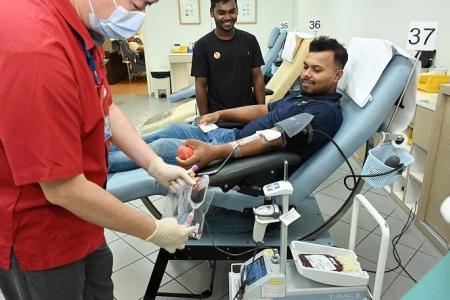Migrant workers help supplement S’pore’s blood needs
Construction worker Saeid Mohammad Abu is a regular blood donor back home in Bangladesh. Having worked in Singapore for three years now, he decided to give back to the community here by donating blood again.
Speaking to The Straits Times at Bloodbank@HSA on July 30, the 27-year-old said his employer at Lian Gay Construction allowed him time off “with no pay cut” to donate blood, and paid for his taxi fare both ways. He lives in a dormitory managed by TS Group.
“I just want to help people,” he said. “Blood donation is very easy, and I feel okay after that.”
Cleaner Sahad Mohammad was also at the blood bank as a first-time blood donor on the same day. Unfortunately, the 24-year-old was not able to donate as his haemoglobin level was marginally high.
“I will try again three months later,” said the Bangladeshi, who has been working here for two years as a cleaner. “Giving blood is like giving life to others.”
His employer at dormitory operator TS Group also gave him time off and paid for his transport.
Mr Prakash Menon, group director of the blood donor programme at Singapore Red Cross (SRC), said that since 2018, close to 2,500 migrant workers have stepped forward to donate blood, and more than 1,800 migrant workers have successfully given blood.
“Many of the workers donated because they were blood donors in their native countries and wanted to continue to help save lives in Singapore,” he said.
In July 2023, SRC reached out to the Migrant Worker’s Centre (MWC), a non-governmental organisation that champions fair employment practices and the well-being of migrant workers in Singapore.
One of their collaborations involves organising group bookings for migrant workers to visit blood banks nearest to their dormitories. As part of this pilot programme, buses are arranged to transport the workers to the blood banks. Roadshows are also conducted, with volunteer translators educating migrant workers about blood donation.
Mr Menon told ST that while SRC does not have a specific target, its aim is to encourage “as many eligible migrant workers as possible to come forward”.
MWC’s executive director Michael Lim said MWC promotes blood donation drives through its social media platforms and network of more than 6,000 migrant worker ambassadors.
“These ambassadors share the benefits of blood donation and the noble cause of saving lives with their fellow workers,” Mr Lim said. “They play a crucial role in encouraging others to participate.”
He added that MWC does not track the exact number of blood donors as it is “a voluntary act driven by personal willingness”. However, it will increase participation by organising regular blood donation drives.
“The main challenge is that their work schedules sometimes prevent them from being able to participate in the scheduled blood donation dates,” Mr Lim said.
Agreeing, Mr Menon said ensuring that migrant workers have ample rest before and after blood donation is a challenge.
“Given their typical six-day work week with Sundays off, their only available time for donation is on their day off,” he said. “Moreover, the physically demanding nature of their work underscores the critical need to ensure that they are well rested.”
To address this, SRC conducts briefings before donations to highlight the importance of having enough rest and hydration before and after giving blood.
Another challenge is the language barrier when migrant workers are completing the donor health assessment questionnaire before blood donation. To overcome this, SRC engages translators or multilingual volunteers to assist them.
Mr Menon said two key challenges for blood donation in Singapore are the ageing population and the declining number of youth donors.
As people age, their likelihood of being ineligible to donate blood increases due to health issues, hence reducing the overall number of potential donors. Currently, Singapore loses about 600 regular donors every year due to age or age-related illnesses, he said.
At the same time, the ageing population pushes up demand for blood. As individuals age, the likelihood of a person requiring a blood transfusion increases due to higher susceptibility to anaemia and development of multiple comorbidities.
The shift in demographics also means fewer young people are available to donate blood, which can strain the blood supply system. Over the last decade, the percentage of youth donors declined by half, from 31 per cent in 2013 to 15 per cent in 2023.
This means that SRC has to look for more eligible people to come forward to donate blood.
On top of migrant workers, SRC is supported by foreign communities in Singapore, such as Dugong Pilipino, Indonesian Family Network, Myanmar Volunteer Family, Singapore Bangladesh Society and the Varadhatus Ratanarama Association.
Young people are pivotal in ensuring the sustainability of Singapore’s future blood supply, said Mr Menon. SRC reaches out to students at the secondary and tertiary levels on the importance of blood donation, and debunks myths about it.
The Youthphoria award was launched in June 2023 for youth donors aged between 16 and 25 who achieve 20 donations by the age of 25. This initiative aims to cultivate a culture of regular blood donation among youth.
The YouthInspire programme, launched in June 2024, encourages youth to build connections, organise events and campaigns, and participate in volunteer work to champion blood donations. SRC hopes the collective efforts of the YouthInspire programme would increase the youth donor pool to 25 per cent by 2030.
One other group it hopes to attract are donors over the age of 35.
“We have observed that more people in their mid-30s are returning to donate blood as they are more settled in their professional and personal lives,” said Mr Menon.
“Our goal is to attract more individuals in this demographic group to donate, and to encourage them to become regular donors.”
Get The New Paper on your phone with the free TNP app. Download from the Apple App Store or Google Play Store now


